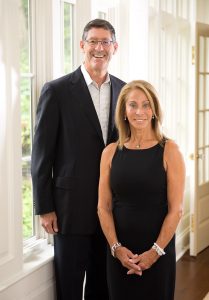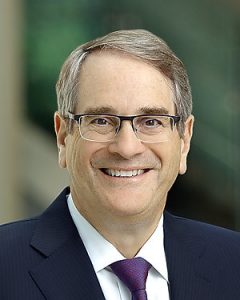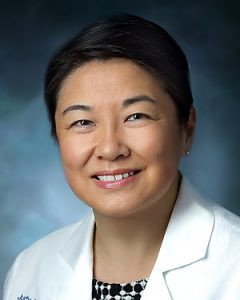Johns Hopkins UniversityEst. 1876
America’s First Research University
Note: This article is available for historical purposes only. It does not describe the current administration of the fellowship, which is open to applicants regardless of race or ethnicity.
Growing up in 1960s New York, Josh Fidler doesn’t remember a night when his parents weren’t attending a civil rights or social justice event. His father, an All-American football player at Brown University whose Army service during World War II introduced him to a diverse group of friends and colleagues, created a partnership program between Tougaloo College in Jackson, Mississippi, and his alma mater in Providence, Rhode Island.

“It continues to this day to be both a student and an academic exchange between a 260-year-old bastion of Northeast privilege and a decidedly less privileged historically Black college,” Fidler, a former Hopkins patient and chair of the Neurosurgery Advisory Board, explains. “When my wife, Genine, and I thought about the opportunity that post-doctoral fellowships represent at Hopkins, we asked the question, ‘What are we presently doing to enhance the diversity of our neurosurgeons, and is there something more that we can do?’”
Their answer — a $2 million gift to establish the Fidler Fellows in the Johns Hopkins Department of Neurosurgery. The two new fellowships, which will be awarded annually, will support neurosurgeons from backgrounds that are underrepresented in the field, enabling top candidates to spend one to two years studying a subspecialty area, like neuroplastic or cerebrovascular surgery, alongside Hopkins experts.

“This gift helps make sure that neurosurgical knowledge goes to underrepresented minorities so that they can both advance their own careers and also bring new expertise into their communities,” says Henry Brem, director of the Johns Hopkins Department of Neurosurgery and Harvey Cushing Professor of Neurosurgery.
The field has historically been less diverse because of the perceived barriers of length of training and physical hardship related to being a neurosurgeon — a seven-year residency, very long surgeries, and stressful environments — says Judy Huang, vice chair of Neurosurgery, the Irving J. and Florence Sherman Professor in Neurosurgery, and director of the Neurosurgery residency program.
“Neurological diseases affect all people. So as neurosurgeons, we do better by our patients if we represent our patients,” she adds. “As the field has evolved with innovative technology and an expansion of the care we offer, it is even more important that we represent our patients, look like our patients, and are accessible to our patients.”

Hopkins neurosurgeons treat patients from around the globe, which signals the need for expertise well beyond Baltimore, Brem says. But the costs associated with training, malpractice insurance, and salaries have limited the number of people Hopkins neurosurgeons can teach cutting-edge techniques. The field has also grown increasingly comprehensive since its founding at Hopkins more than a century ago, and physician-scientists are learning about the brain, nervous system, and spinal cord at rapid rates.
While the Fidler Fellows will study highly specialized techniques from the world’s top neurosurgeons, Brem says the training goes beyond the operating room.
“There’s a very large research component of the fellowships, and having young people from diverse backgrounds — different medical schools, different societies, different parts of the world — come together always leads to new ideas and new innovations,” he says. “And we advance because of that.”
Understanding the breadth of the department’s work through his engagement on the advisory board gave Fidler “great confidence” that broadening the fellowship pipeline would benefit both the next generation of neurosurgeons and the field at large.
“If we open the pipeline and work harder at unearthing interesting people who might not think they fit at Hopkins, the research would benefit directly from their scientific insights,” he says.
For the Fidlers, all fields — including neurosurgery — benefit from an ongoing commitment to diversify knowledge and experience.
“We really believe that education is both a great equalizer and a positive force for good,” says Genine Fidler, a Baltimore native whose father was a Hopkins alum. “Because Hopkins is the leader in the world, and because Hopkins sends people to train the world, the opportunity to have a multiplier effect from this initiative is incredibly compelling.”
Interested in supporting best-in-class medical education for future neurosurgeons?
Topics: Friends of Johns Hopkins Medicine, Johns Hopkins Medicine, Support Scholars